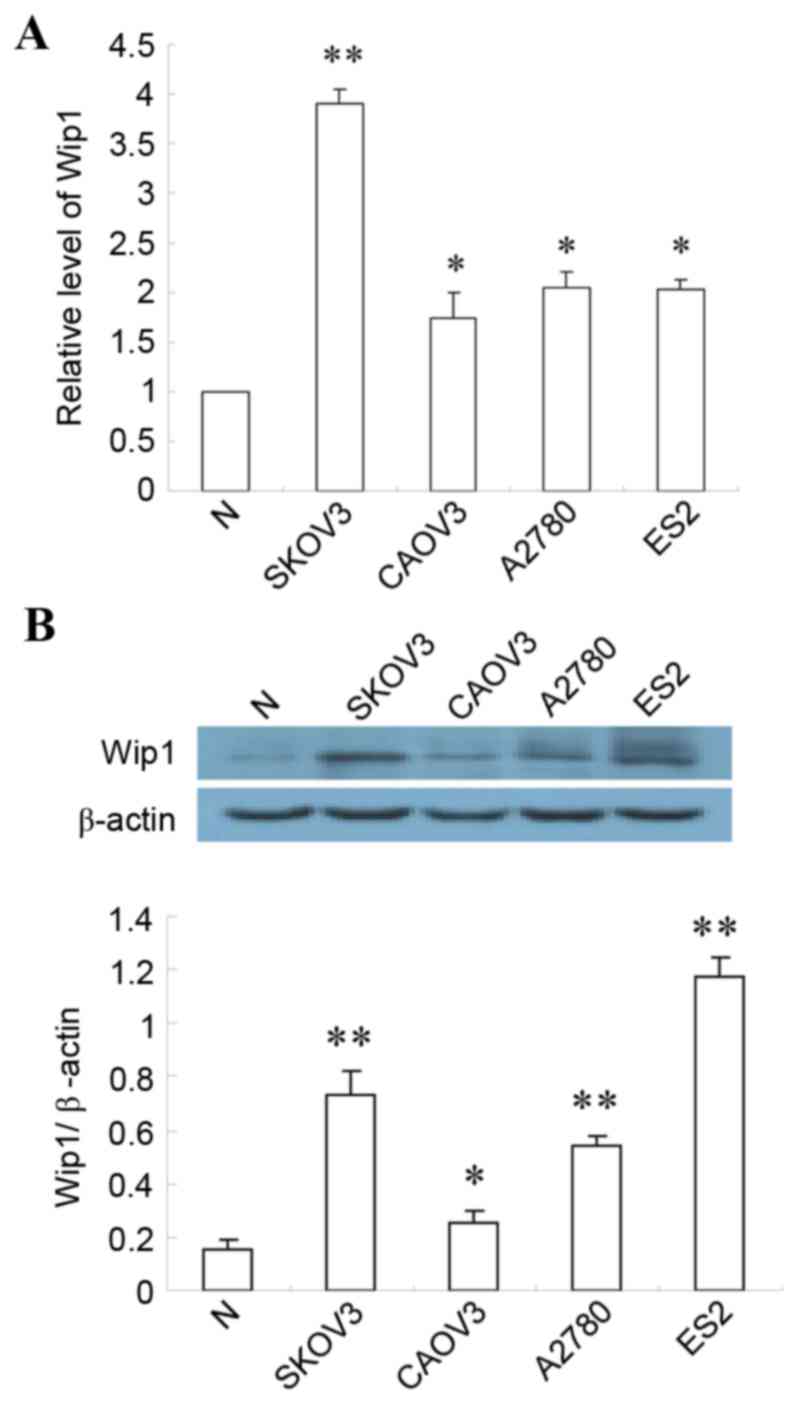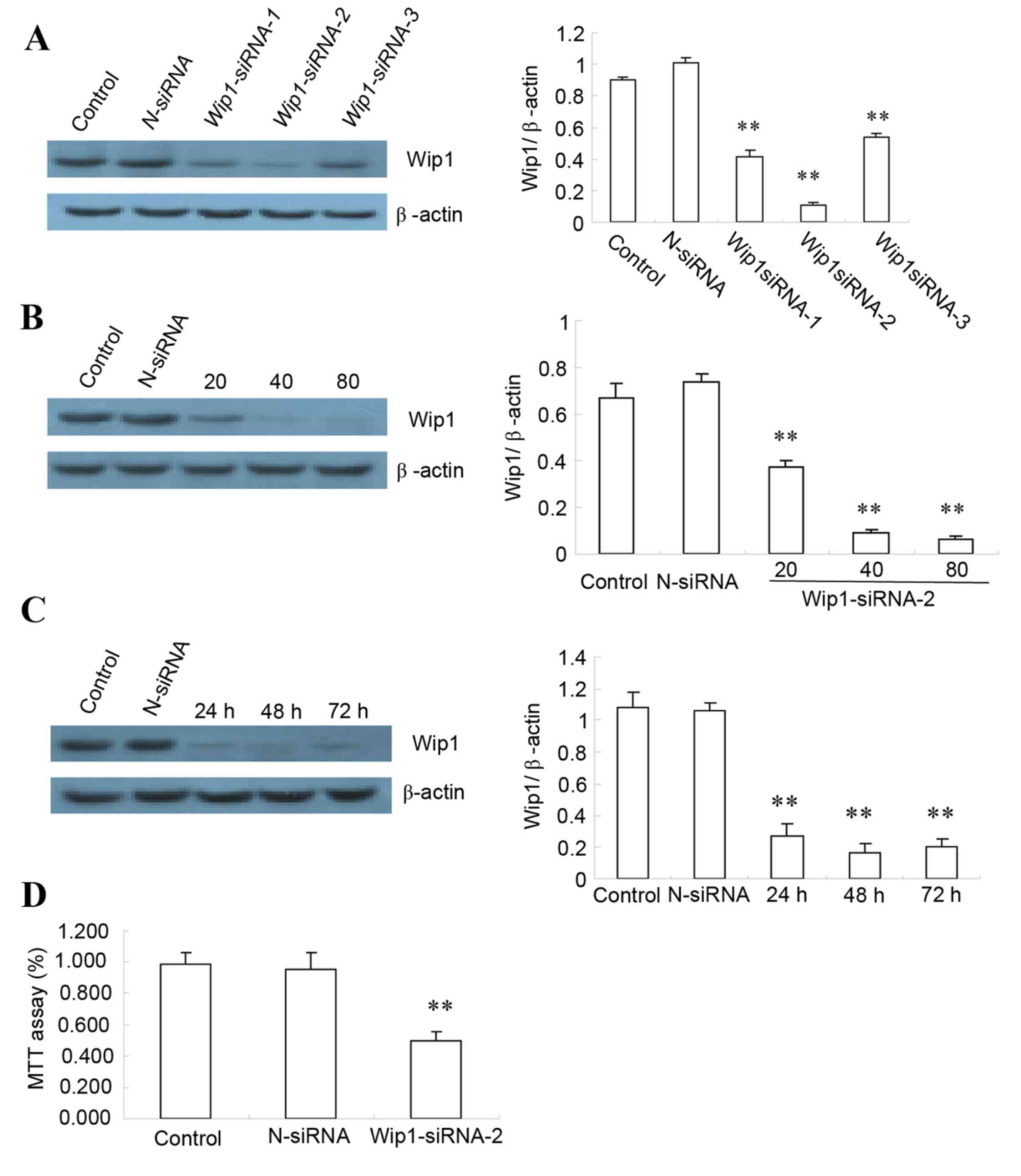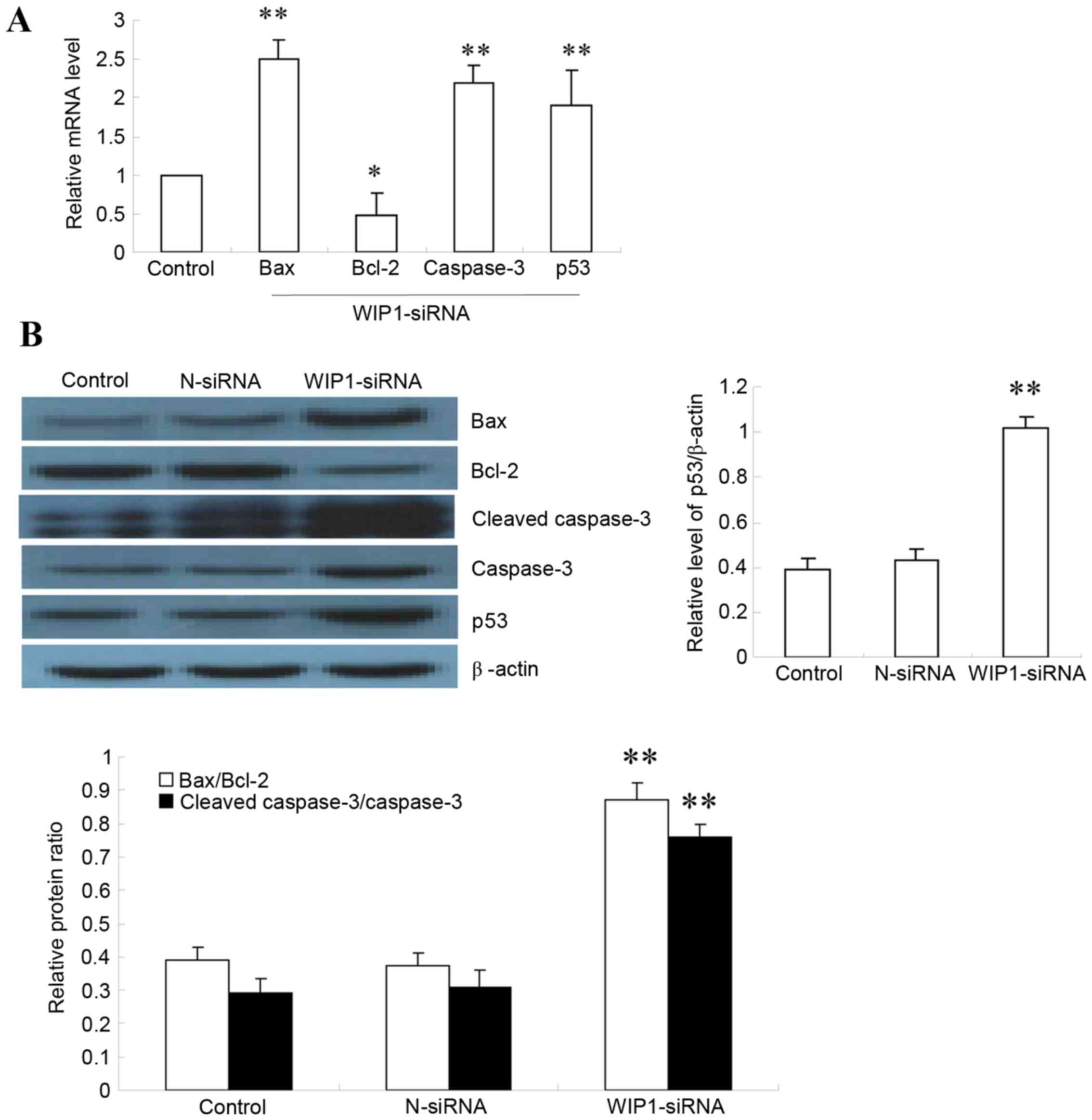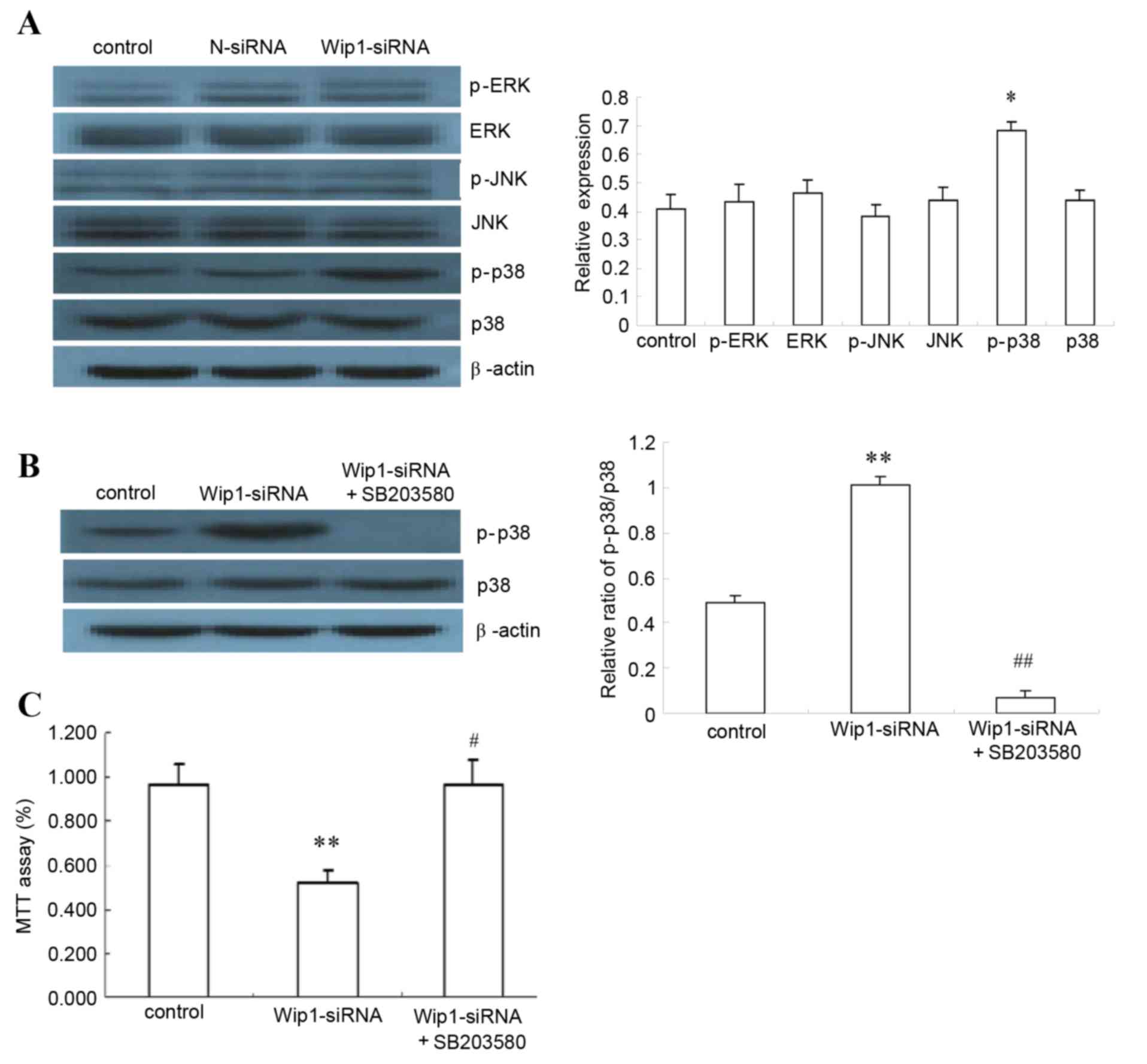|
1
|
Jemal A, Bray F, Melissa M, Ferlay J, Ward
E and Forman D: Global cancer statistics. CA Cancer J Clin.
61:69–90. 2011. View Article : Google Scholar : PubMed/NCBI
|
|
2
|
Chen Y, Bieber MM and Teng NN: Hedgehog
signaling regulates drug sensitivity by targeting ABC transporters
ABCB1 and ABCG2 in epithelial ovarian cancer. Mol Carcinog.
53:625–634. 2014.PubMed/NCBI
|
|
3
|
Zhang P, Jia R, Ying L, Liu B, Qian G, Fan
X and Ge S: WWOX-mediated apoptosis in A549 cells mainly involves
the mitochondrial pathway. Mol Med Rep. 6:121–124. 2012.PubMed/NCBI
|
|
4
|
Fiscella M, Zhang H, Fan S, Sakaguchi K,
Shen S, Mercer WE, Woude GF Vande, O'Connor PM and Appella E: Wip1,
a novel human protein phospahtase that is induced in response to
ionizing radiation in a p53-dependent manner. Proc Natl Acad Sci
USA. 94:pp. 6048–6053. 1997; View Article : Google Scholar : PubMed/NCBI
|
|
5
|
Hirasawa A, Saito-Ohara F, Inoue J, Aoki
D, Susumu N, Yokoyama T, Nozawa S, Inazawa J and Imoto I:
Association of 17q21-q24 gain in ovarian clear cell adenocarcinomas
with poor prognosis and identification of PPM1D and APPBP2 as
likely amplification targets. Clin Cancer Res. 9:1995–2004.
2003.PubMed/NCBI
|
|
6
|
Richter M, Dayaram T, Gilmartin AG, Ganji
G, Pemmasani SK, Van Der Key H, Shohet JM, Donehower LA and Kumar
R: WIP1 phosphatase as a potential therapeutic target in
neuroblastoma. PLoS One. 10:e01156352015. View Article : Google Scholar : PubMed/NCBI
|
|
7
|
Tang YL, Liu X, Gao SY, Feng H, Jiang YP,
Wang SS, Yang J, Jiang J, Ma XR, Tang YJ, et al: WIP1 stimulates
migration and invasion of salivary adenoid cystic carcinoma by
inducing MMP-9 and VEGF-C. Oncotarget. 6:9031–9044. 2015.
View Article : Google Scholar : PubMed/NCBI
|
|
8
|
Ma X, Han J, Wu Q, Liu H, Shi S, Wang C,
Wang Y, Xiao J, Zhao J, Jiang J and Wan C: Involvement of
dysregulated Wip1 in manganese-induced p53 signaling and neuronal
apoptosis. Toxicol Lett. 235:17–27. 2015. View Article : Google Scholar : PubMed/NCBI
|
|
9
|
Sun GG, Zhang J, Ma XB, Wang YD, Cheng YJ
and Hu WN: Overexpression of Wild-Type p53-Induced Phosphatase 1
confers poor prognosis of patients with Nasopharyngeal Carcinoma.
Pathol Oncol Res. 21:283–291. 2015. View Article : Google Scholar : PubMed/NCBI
|
|
10
|
Sun GG, Wang YD, Liu Q and Hu WN:
Expression of Wip1 in kidney carcinoma and its correlation with
tumor metastasis and clinical significance. Pathol Oncol Res.
21:219–224. 2015. View Article : Google Scholar : PubMed/NCBI
|
|
11
|
Livak KJ and Schmittgen TD: Analysis of
relative gene expression data using real-time quantitative PCR and
the 2(−Delta Delta C(T)) Method. Methods. 25:402–408. 2001.
View Article : Google Scholar : PubMed/NCBI
|
|
12
|
Lee JS, Park JR, Kwon OS, Kim H, Fornace
AJ Jr and Cha HJ: Off-target response of a Wip1 chemical inhibitor
in skin keratinocytes. J Dermatol Sci. 73:125–134. 2014. View Article : Google Scholar : PubMed/NCBI
|
|
13
|
Yang DH, He JA, Li J, Ma WF, Hu XH, Xin SJ
and Duan ZQ: Expression of proto-oncogene Wip1 in breast cancer and
its clinical significance. Zhonghua Yi Xue Za Zhi. 90:519–522.
2010.PubMed/NCBI
|
|
14
|
Li J, Yang Y, Peng Y, Austin RJ, Van
Eyndhoven WG, Nguyen KC, Gabriele T, McCurrach ME, Marks JR, et al:
Oncogenic properties of PPM1D located within a breast cancer
amplification epicenter at 17q23. Nat Genet. 31:133–134. 2002.
View Article : Google Scholar : PubMed/NCBI
|
|
15
|
Bulavin DV, Demidov ON, Saito S,
Kauraniemi P, Phillips C, Amundson SA, Ambrosino C, Sauter G,
Nebreda AR, Anderson CW, et al: Amplification of PPM1D in human
tumors abrogates p53 tumor-suppressor activity. Nat Genet.
31:210–215. 2002. View
Article : Google Scholar : PubMed/NCBI
|
|
16
|
Rauta J, Alarmo EL, Kauraniemi P, Karhu R,
Kuukasjärvi T and Kallioniemi A: The serine-threonine protein
phosphatase PPM1D is frequently activated through amplification in
aggressive primary breast tumours. Breast Cancer Res Treat.
95:257–263. 2006. View Article : Google Scholar : PubMed/NCBI
|
|
17
|
Fuku T, Semba S, Yutori H and Yokozaki H:
Increased wild-type p53-induced phosphatase 1 (Wip1 or PPM1D)
expression correlated with downregulation of checkpoint kinase 2 in
human gastric carcinoma. Pathol Int. 57:566–571. 2007. View Article : Google Scholar : PubMed/NCBI
|
|
18
|
Castellino RC, De Bortoli M, Lu X, Moon
SH, Nguyen TA, Shepard MA, Rao PH, Donehower LA and Kim JY:
Medulloblastomas overexpress the p53-inactivating oncogene
WIP1/PPM1D. J Neurooncol. 86:245–256. 2008. View Article : Google Scholar : PubMed/NCBI
|
|
19
|
Ehrbrecht A, Müller U, Wolter M, Hoischen
A, Koch A, Radlwimmer B, Actor B, Mincheva A, Pietsch T, Lichter P,
et al: Comprehensive genomic analysis of desmoplastic
medulloblastomas: Identification of novel amplified genes and
separate evaluation of the different histological components. J
Pathol. 208:554–563. 2006. View Article : Google Scholar : PubMed/NCBI
|
|
20
|
Mendrzyk F, Radlwimmer B, Joos S,
Kokocinski F, Benner A, Stange DE, Neben K, Fiegler H, Carter NP,
Reifenberger G, et al: Genomic and protein expression profiling
identifies CDK6 as novel independent prognostic marker in
medulloblastoma. J Clin Oncol. 23:8853–8862. 2005. View Article : Google Scholar : PubMed/NCBI
|
|
21
|
Saito-Ohara F, Imoto I, Inoue J, Hosoi H,
Nakagawara A, Sugimoto T and Inazawa J: PPM1D is a potential target
for 17q gain in neuroblastoma. Cancer Res. 63:1876–1883.
2003.PubMed/NCBI
|
|
22
|
Tan DS, Lambros MB, Rayter S, Natrajan R,
Vatcheva R, Gao Q, Marchiò C, Geyer FC, Savage K, Parry S, et al:
PPM1D is a potential therapeutic target in ovarian clear cell
carcinomas. Clin Cancer Res. 15:2269–2280. 2009. View Article : Google Scholar : PubMed/NCBI
|
|
23
|
Lowe J, Cha H, Lee MO, Mazur SJ, Appella E
and Fornace A J Jr: Regulation of the Wip1 phosphatase and its
effects on the stress response. Front Biosci (Landmark Ed).
17:1480–1498. 2012. View
Article : Google Scholar : PubMed/NCBI
|
|
24
|
Zhang XP, Liu F and Wang W: Two-phase
dynamics of p53 in the DNA damage response. Proc Natl Acad Sci USA.
108:pp. 8990–8995. 2011; View Article : Google Scholar : PubMed/NCBI
|
|
25
|
Song JY, Ryu SH, Cho YM, Kim YS, Lee BM,
Lee SW and Choi J: Wip1 suppresses apoptotic cell death through
direct dephosphorylation of BAX in response to γ-radiation. Cell
Death Dis. 4:e7442013. View Article : Google Scholar : PubMed/NCBI
|
|
26
|
Wang HY, Liu ZS, Qiu L, Guo J, Li YF,
Zhang J, Wang TJ and Liu XD: Knockdown of Wip1 enhances sensitivity
to radiation in hela cells through activation of p38 MAPK. Oncol
Res. 22:225–233. 2014. View Article : Google Scholar : PubMed/NCBI
|
|
27
|
Goloudina AR, Mazur SJ, Appella E, Garrido
C and Demidov ON: Wip1 sensitizes p53-negative tumors to apoptosis
by regulating the Bax/Bcl-xL ratio. Cell Cycle. 11:1883–1887. 2012.
View Article : Google Scholar : PubMed/NCBI
|
|
28
|
Holnes WF, Soprano DR and Soprano KJ:
Early events in the induction of apoptosis in ovarian carcinoma
cells by CD437: Activation of the p38 MAP kinase signal pathway.
Oncogene. 22:6377–6386. 2003. View Article : Google Scholar : PubMed/NCBI
|
|
29
|
Tallman M, Lo-Coco F, Barnes G, Kruse M,
Wildner R, Martin M, Mueller U and Tang B: Cost-effectiveness
analysis of treating acute promyelocytic leukemia patients with
arsenic trioxide and retinoic acid in the United States. Clin
Lymphoma Myeloma Leuk. 15:771–777. 2015. View Article : Google Scholar : PubMed/NCBI
|
|
30
|
Shepshelovich D, Oniashvili N, Parnes D,
Klein A, Muchtar E, Yeshaya J, Aviram A, Rabizadeh E and Raanani P:
Acute promyelocytic leukemia with isochromosome 17q and cryptic
PML-RARA successfully treated with all-trans retinoic acid and
arsenic trioxide. Cancer Genet. 208:575–579. 2015. View Article : Google Scholar : PubMed/NCBI
|
|
31
|
Yoda A, Toyoshima K, Watanabe Y, Onishi N,
Hazaka Y, Tsukuda Y, Tsukada J, Kondo T, Tanaka Y and Minami Y:
Arsenic trioxide augments Chk2/p53-mediated apoptosis by inhibiting
oncogenic Wip1 phosphatase. J Biol Chem. 283:18969–18979. 2008.
View Article : Google Scholar : PubMed/NCBI
|



















